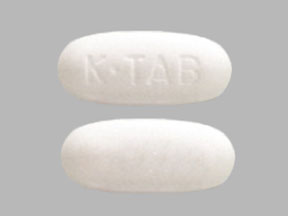K-Tab Dosage
Generic name: POTASSIUM CHLORIDE 750mg
Dosage form: tablet, film coated, extended release
Drug class: Minerals and electrolytes
Medically reviewed by Drugs.com. Last updated on Mar 22, 2024.
2.1 Monitoring and Administration
If serum potassium concentration is less than 2.5 mEq/L, use intravenous potassium instead of oral supplementation.
Monitoring
Monitor serum potassium and adjust the dose based on serum potassium level. Monitor serum potassium periodically during maintenance therapy to ensure potassium remains in desired range.
The treatment of potassium depletion, particularly in the presence of cardiac disease, renal disease, or acidosis, requires careful attention to acid-base balance, volume status, electrolytes, including magnesium, sodium, chloride, phosphate, and calcium, electrocardiograms, and the clinical status of the patient. Correct volume status, acid-base balance, and electrolyte deficits as appropriate.
Administration
Take K-TAB with meals and with a glass of water or other liquid. Do not take on an empty stomach because of its potential for gastric irritation [see Warnings and Precautions (5.1)].
Swallow tablets whole without crushing, chewing or sucking.
2.2 Dosing
Dosage must be adjusted to the individual needs of each patient. Dosages greater than 20 mEq per day should be divided such that no more than 20 mEq is given in a single dose.
Treatment of hypokalemia: Typical dose range is 40-100 mEq per day.
Prevention of hypokalemia: Typical dose is 20 mEq per day.
Frequently asked questions
More about K-Tab (potassium chloride)
- Check interactions
- Compare alternatives
- Pricing & coupons
- Reviews (1)
- Drug images
- Side effects
- During pregnancy
- Drug class: minerals and electrolytes
- En español
Patient resources
Other brands
Klor-Con, K-Dur, Micro-K, Kaon-CI, Rum-K
Professional resources
Other brands
Klor-Con, K-Dur, Slow-K, Micro-K, ... +3 more
Related treatment guides
Further information
Always consult your healthcare provider to ensure the information displayed on this page applies to your personal circumstances.

